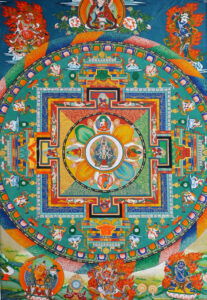Back in my business communication teaching days I often shared a tidbit with my classes that I picked up from the career center: To prepare for a job interview, make sure you can answer “how” and “why” to everything you wrote on your resume.
This seems like a good process for writers, too. We can ask ourselves questions like:
- Why am I choosing to break this line in this spot?
- Why would my character say–*that*? Or do *that*?
- How can I convey my character’s emotions from describing the way she’s opening her backpack?
- How can I integrate setting more effectively here to raise the emotional temperature of this conflict?
- Why am I using a metaphor here instead of sticking to the actual image?
The questions can be endless. And while I almost never answer them with a logical and well-worded rationale, I do use them as a guiding light through my intuitive fogginess. In other words, the mere act of framing the question can help me figure out if the choices I’m making feel true and right, and also inspire me to try a few different approaches and compare the effects.
Lately, I’ve also been putting some of these questions in play in my piano practicing. How soft should I make this part? How much rubato is too much? Articulating a rationale is even harder since both my intuition and field of knowledge are on much shakier ground. But framing the questions in order to consider different ways of playing gives me a sense of the options. And since I’m no longer trying to prove anything to anyone about my piano-playing, I end up just choosing what I like.
As I’ve had to sacrifice some of my writing and piano time to tackle book-marketing, I’ve come up against how/why questions that feel more annoying–perhaps because interviewers, bloggers, and podcasters need to have clear and well-worded responses, rather than the multi-directional swirls in my mucky brain.
Q. Why did you become a writer?
True answer: I don’t know. I’ve just always wanted to be one.
Cheeky answer (because true answer is way too bland): Because I knew I didn’t have the chops to make it as a Broadway or Carnegie Hall star. And with writing, you can have as many do-overs as you want before you put your work out in the world.
Q. How do you like to write? With a pen? On the computer? In the morning? Afternoon? Middle of the night?
True answer: Sometimes pen, sometimes screen. Morning is best, but I can force myself to write at any hour if I’m disciplined enough.|
Cheeky answer (because true answer is way too bland, and how I like to write has nothing to do with how someone else might like to write): Actually, I like to carve my thoughts in sand with a stick and then erase them like a Tibetan mandala. And, I guarantee, the muse doesn’t care what time it is and what color pen you’re writing with, even if you might care.

Prof Ranga Sai, CC BY-SA 4.0 <https://creativecommons.org/licenses/by-sa/4.0>, via Wikimedia Commons
So what questions do I hope people will ask me at my book launch reading for IMMIGRANTS on Wednesday night. Here are a few I’d love to chew on:
- What was the hardest story in the book to write and why?
- Which of your characters did you fall in love with and why? Which characters were difficult to empathize with and how did you manage to overcome that challenge?
- How will you deal with reactions to this book from people who aren’t sympathetic to immigrant issues?
True confession: At this moment, I don’t know the answers to any of these questions, but I promise to corral the various options and choose one well-worded answer–just as I would in a job interview!
